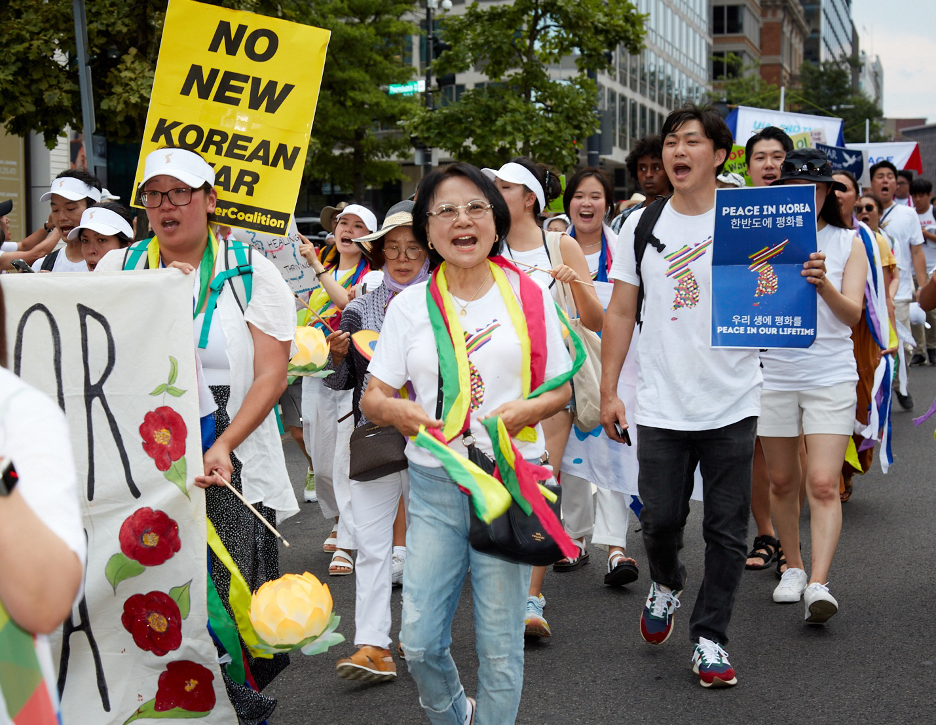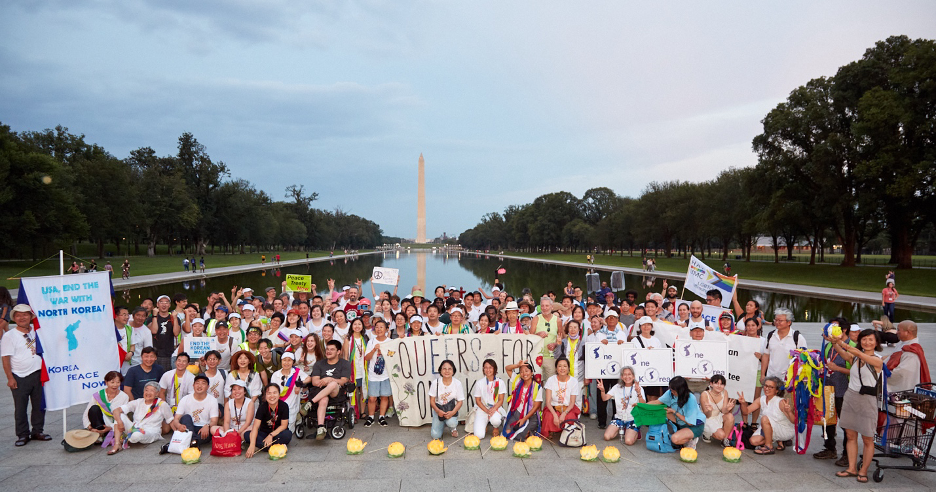“War doesn’t just destroy the buildings and army, it impacts everyone,” said Joy Gebhard, who was just a 16 years old aspiring doctor when the U.S. bombed the North Korean city where she was studying before her graduation in 1950.
After surviving machine gunfire, she walked back to her family’s home in Pyongyang — sleeping in farmhouses along the way — she greeted her parents for the first time since the Korean War broke out a month earlier. Three weeks later, her father died of cancer.
With her mother’s permission, Gebhard went south of the 38th parallel — into what is now South Korea — to escape frequent bombing raids. After arriving in December 1950, the friend that accompanied her died within months. Eventually, Gebhard immigrated to the U.S. Recounting her story at a conference held as part of last week’s national peace mobilization at George Washington University, she called the war “a bomb that destroyed all I had worked for.”
That impact persists for Gebhard, who hasn’t seen her family for seven years, since the U.S. banned American citizens from traveling to North Korea. She’s one of tens of thousands unable to see loved ones due to the ongoing Korean War. Seventy years after the Korean Armistice Agreement, the U.S. and North Korea have not signed a peace treaty. But last week, peace activists, doctors, nuclear scientists, historians and retired military officials gathered in Washington, D.C. to push for one.
The national mobilization started during a week of heightened tensions on the Korean peninsula. Only days earlier, on July 24, the U.S. sent a second nuclear submarine to South Korea. The North responded by firing two short-range ballistic missiles.
There are more than 28,000 American troops in South Korea and the U.S. holds the North under sectoral sanctions. Kee Park, a medical doctor at Harvard University’s Department of Global Health and Social Medicine, said such sanctions are “designed to block all of North Korea’s exports,” such as garments, minerals and seafood. “Think about sanctions as warfare without bullets,” he said, likening the deadly scope of sectoral sanctions to the effects of nuclear warfare, which also threatens the peninsula. As retired Gen. Dan Leaf noted, “We’re one bad decision away from nuclear war with North Korea.” This is why Leaf and others believe a peace treaty needs to be reached.
Meanwhile, the Wall Street Journal published an opinion piece from South Korean National Assembly Member Ji Seong-ho slamming what he calls the “phony Korean peace movement.” Another opinion article in Newsweek by the sanctions-supporting North Korean Freedom Coalition advisor Lawrence Peck criticized co-conveners of the mobilization, such as Nodutdol — a group composed of diasporic Koreans organizing for a “world free of imperialism, and for Korea’s re/unification and national liberation.”
Nodutdol collected postcards in the runup to the 70th anniversary of the armistice, with signatures demanding the U.S. State Department lift the travel ban keeping Gebhard and many others from seeing their families.
“What we’re hoping to do is show how this travel ban doesn’t promote peace, doesn’t keep people safe, and can be considered a violent act of separation,” said Nodutdol member Betsy Yoon.
Another member, Ju-Hyun Park, referred to the group’s critics as the ones holding extremist positions.“ They’re saying that Korea, a country that has over a thousand years of united history, should remain divided because the U.S. is saying so. They’re going against the vast majority of not only what Korean people want but what most Americans probably want.” A recent American Friends Service Committee/Harris poll found 52 percent of Americans want the U.S. to formally end the war.
Yoon said the backlash to the mobilization “is a sign that opposing forces are maybe a little worried about the growing strength of the Korea peace movement.”
“We brought together a multi-generational, multi-racial, multi-sectoral community with diverse perspectives and expertise to demonstrate that we are indeed a powerful movement that offers a vision of hope, peace, and true human security,” said Women Cross DMZ Executive Director Christine Ahn, a leading organizer of last week’s mobilization.

Women Cross DMZ brought 30 people under the age of 30 to the mobilization. One of them, Giboom Park, came all the way from Chicago, where she advocates for gender-based violence survivors. “It feels so powerful to see so many people from different cities gather for this movement that we’re all so passionate about,” Park said, adding that “there’s so much change that needs to be done and so much that we have to undo.”
“I often felt isolated at home up in New Hampshire,” said Hayden Smith, another 30-under-30 participant. “But now, knowing that this is here, and that we’re all together in this, I feel a lot more powerful.”
After the congressional press conference, many gathered at Foundry United Methodist Church for a community grief ceremony. Participants wrote down their han — often described as an internalized feeling of sorrow or grief — on pieces of paper in a collective healing process. The ceremony included Korean drummers as well as a captivating and participatory song-and-dance performance by Dohee Lee, the director of Puri Arts.
“It’s a very natural thing for me to participate in the peace movement,” said Lee, who explained that some in her family fought for independence during the colonial era. “Their activism is in my DNA.”
Everyone at the grief ceremony was encouraged to take a ribbon with tied knots and untie them, symbolically undoing the distress faced by their ancestors, before a communal dance. “When we really physically and emotionally decolonize our body, that’s the way we can release grief,” said Lee. “With a little chance to heal, we have the power to keep going.”
And the mobilization kept going that Thursday, with 500 people gathering in front of the White House in 97-degree heat. Organizers provided water and gimbap [a seaweed rice roll ], as an impassioned group of speakers made it clear to all passersby — and hopefully President Biden — that they wanted an end to the longest war in American history.
“So far, the same old tactic or narrative was that [North Korea] had to meet the conditions to have peace,” said Rev. We Hyun Chang, one of that day’s speakers. “We have to put that the other way around. We’ve tried it for 70 years and it only got worse. We have to put peace first.”
Sheen Kim, a 30-under-30 member from Las Vegas, noted how many groups attended the demonstration in solidarity — from Quakers to veterans.
“There’s also a militant labor movement, a very militant leftist movement in Korea that was suppressed, that has been pushing this mission forward constantly,” Kim said. “It’s coalescing with the anti-war movement in the U.S.”
The rally was followed by a march to the Lincoln Memorial. Organizers held an interfaith prayer vigil that included a repentance prayer to commemorate all those affected by the war — from civilians to reunification advocates to those who died of untreated diseases during the conflict.
On Friday morning, the mobilization moved indoors to George Washington University’s Elliott School of International Affairs. Attendees grabbed pastries and coffee before sitting down to listen and ask questions to panelists and the keynote speaker, historian Bruce Cumings, who gave historical insight regarding the contemporary state of the war.
“Eisenhower and Dulles both claimed it was nuclear terror that brought North Korea to sign the armistice,” Cumings said. In fact, it was the Eisenhower administration that gave South Korean President Rhee Syngman nuclear weapons, violating Section 13d of the Korean Armistice Agreement. The U.S. didn’t withdraw those weapons until 1991. “If you situate yourself in Pyongyang and you don’t know from Tuesday to Wednesday whether you might be hit with an atomic bomb, that’s terrorism.”
North Korea’s nuclear program was started for research and energy purposes, under the auspices of the Nuclear Non-Proliferation Treaty, which Pyongyang signed in 1985. “From that point until 2003, they saw their nuclear program, their plutonium, as a bargaining chip to get normal relations with the U.S.,” Cumings said. “But when George W. Bush accused them of terrorism and being in the axis of evil, and Bolton went after the 1994 freeze agreement, that’s when they decided these people are hopeless; our only choice is to develop a nuclear weapon. And three years later, they had one.”
Cumings also shared the history of economic warfare in Korea, noting that sanctions began in 1949 before the Korean War and that “North Korea is the most sanctioned country on Earth.”
Rick Downes, executive director of the Coalition of Families of Korean & Cold War POW/MIAs, underscored how difficult the ongoing war makes recovering the remains of U.S. soldiers. While North Korea permits families access, the travel ban of 2017 makes visiting the country impossible.

“Never a day went by without me thinking of family,” Gebhard told the conference, recounting how the Korean War changed her life. For years, Gebhard wrote letters to her mother in Pyongyang, but they would consistently be returned. She visited North Korea in 1988. Her sister then told her that her mother had died a month after she left home. Gebhard continued to visit surviving loved ones. Her last visit was in 2016, before the travel ban.
Panelists also said the travel ban is an obstacle to people-to-people relations. Retired Army Col. Ann Wright expressed support for cultural engagement with North Korea, citing the role of ping-pong diplomacy in normalizing ties between the U.S. and China. We can get around the travel ban, “if there’s enough popular support,” she said.
“If we’re not doing that serious work about peace, we’re not serious about peace,” said Leaf, who proposes a government office dedicated to handling peace with North Korea.
“The Korea peace movement in the U.S. and its ties in North and South Korea have continued to deepen, but so has the crisis,” said Code Pink co-founder Medea Benjamin, who also spoke at the White House rally. “Every time we mobilize, we get stronger. Every time we bring people together, we inspire each other. I’m so inspired by this 30-under-30 group.”
As the conference ended, Giboom Park expressed mixed emotions that the conference was over. “After this conference, we are all being separated,” she said, adding that “it’s not an insanely huge movement in comparison to the grandiose military-industrial complex. But I’m hoping that through these connections, we will be able to grasp as much hope as we can and the passion for making a better world despite the odds of it all.”
Thirty-three U.S. house representatives have co-sponsored H.R. 1369, or the Peace on the Korean Peninsula Act, including U.S. Reps. Barbara Lee and Judy Chu who both spoke at Thursday’s congressional briefing. But as the Korean Armistice Agreement enters its 70th year, participants of last week’s mobilization say they’re determined to keep working for peace.
Editor’s note 8/11/2023: Joy Gebhard’s name was incorrectly spelled “Gebhart.”
I attended these events, and Cale did great work reporting. 👏🏻👏🏻👏🏻 #EndTheKoreanWar #KoreaPeaceNow